|
|
|
Sort Order |
|
|
|
Items / Page
|
|
|
|
|
|
|
| Srl | Item |
| 1 |
ID:
161053


|
|
|
|
|
| Summary/Abstract |
The paper studies the “Turkish model” in a comparative historical perspective from three angles: as an example of mobilization modernization; as a combination of liberal democracy and Islam; and as a de-Westernization paradigm. The focus is on the transformation of the “Turkish model” and its substantive evolution from the early 1990s to the middle of the 2010s, and on how peaks of international interest in the “Turkish model” impacted Ankara’s foreign policy activities and its positioning on the international stage by Turkish elites. This approach helped to identify the factors behind periodic resurgence and transformation of the “Turkish model” and the shifting balance between the expectations of its potential recipients and Ankara’s plans to use it as a foreign-policy tool. Research methodology is based on the theory of multiple modernities and the concept of symbolic interactionism in international relations. In the case of Turkey, this approach provides broader possibilities for interpreting Ankara’s foreign-policy strategies and understanding the mechanisms of its relations with other countries in the Greater Middle East.
|
|
|
|
|
|
|
|
|
|
|
|
|
|
|
|
| 2 |
ID:
189709
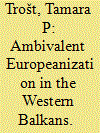

|
|
|
|
|
| Summary/Abstract |
The drawn-out process of applying for European Union membership has encouraged cynicism in Serbia and other Western Balkan states about the value of becoming part of the bloc. Local elites have instrumentalized the accession process, making a show of superficial compliance with EU conditions while eroding democratic institutions and stoking popular backlashes against EU-mandated protections for minorities. Perceptions that Brussels has turned a blind eye to such behavior have weakened the pro-European camp in the region.
|
|
|
|
|
|
|
|
|
|
|
|
|
|
|
|
| 3 |
ID:
087004
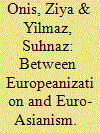

|
|
|
|
|
| Publication |
2009.
|
| Summary/Abstract |
Focusing on Turkish foreign policy in the post-Cold War era, this paper argues that the period can be divided into three distinct phases: an initial wave of foreign policy activism in the immediate post-Cold War context; a new or second wave of foreign policy activism during the Justice and Development Party (Adalet ve Kalk?nma Partisi, AKP) government era with a strong emphasis on Europeanization; and the more recent tension between Europeanization and Euro-Asianism. This paper argues that during the AKP era Turkey maintained considerable continuity in terms of foreign policy activism and a multilateral approach to policymaking. Yet at the same time, a certain discontinuity or rupture can be identified starting in the middle of the first AKP government's reign, signifying a shift from a commitment to deep Europeanization to loose Europeanization along with a parallel shift to a soft Euro-Asianism. Ultimately, the interaction between an intricate set of priorities on the domestic and international fronts will determine the future path of Turkish foreign policy.
|
|
|
|
|
|
|
|
|
|
|
|
|
|
|
|
| 4 |
ID:
087006
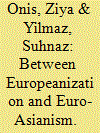

|
|
|
|
|
| Publication |
2009.
|
| Summary/Abstract |
Focusing on Turkish foreign policy in the post-Cold War era, this paper argues that the period can be divided into three distinct phases: an initial wave of foreign policy activism in the immediate post-Cold War context; a new or second wave of foreign policy activism during the Justice and Development Party (Adalet ve Kalk?nma Partisi, AKP) government era with a strong emphasis on Europeanization; and the more recent tension between Europeanization and Euro-Asianism. This paper argues that during the AKP era Turkey maintained considerable continuity in terms of foreign policy activism and a multilateral approach to policymaking. Yet at the same time, a certain discontinuity or rupture can be identified starting in the middle of the first AKP government's reign, signifying a shift from a commitment to deep Europeanization to loose Europeanization along with a parallel shift to a soft Euro-Asianism. Ultimately, the interaction between an intricate set of priorities on the domestic and international fronts will determine the future path of Turkish foreign policy.
|
|
|
|
|
|
|
|
|
|
|
|
|
|
|
|
| 5 |
ID:
129210
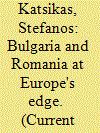

|
|
|
|
|
| Publication |
2014.
|
| Summary/Abstract |
Bulgaria and Romania joined the European Union as full member states on January 1, 2007. This momentous event was the culmination of a long and demanding political project that has often been described as "Europeanization." Although the foundations of this project were laid fairly soon after the fall of both countries' communist regimes in 1989, the pace was slow, and did not really gain momentum
until the end of the 1990s. Over the years the project ebbed and flowed, but what kept both nations committed was their strong belief that joining the EU would fill the political, economic, and security vacuum that the dissolution of the communist bloc had produced. EU membership was popularly seen as a panacea that would allow Bulgaria and Romania to stabilize their newborn democratic systems and overcome the economic problems of the postcommunist transition. It offered confirmation that the Bulgarians and Romanians were really Europeans. Seven years later, however, rather than feeling pulled into the heart of Europe, Bulgaria and Romania find themselves at the edge. Their EU partners raise questions about their commitment to the rule of law and their willingness to crack down on organized crime and illegal immigration. Does this mean that membership has not been an easy route to democratic stability, economic growth, and greater opportunity for all? European integration may be a difficult topic at a time when economic crisis has, for some, cast the entire effort into doubt. But the situation of Romania and Bulgaria lends itself to reflection on the wider project and its overall historical importance.
|
|
|
|
|
|
|
|
|
|
|
|
|
|
|
|
| 6 |
ID:
190854
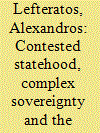

|
|
|
|
|
| Summary/Abstract |
The emergence, longevity and resilience of contested states have redefined the relationship between sovereignty and territoriality. While fully-fledged states uphold the monopoly of authority, contested states seek to rewrite the sovereignty playbook and gain a seat among sovereign equals. This atypical antagonism, propped up by post-Westphalian statehood aspirations, has changed the way sovereignty is perceived and understood nowadays. Approaching sovereignty as multi-faceted, this article discusses contested statehood in the context of the EU's engagement overseas. Drawing on the literature of Europeanisation and complex sovereignty, it accounts for the influence of contested statehood on the EU's role and policies in contested states. Specifically, by delving into Kosovo's complex sovereignty (internal/external), the analysis measures the fluctuating impact of contestedness on the EU's employed policy frameworks and deployed crisis management tools unfolding a paradox that has defined the EU's foreign policy in Kosovo for years.
|
|
|
|
|
|
|
|
|
|
|
|
|
|
|
|
| 7 |
ID:
121853
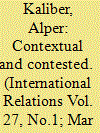

|
|
|
|
|
| Publication |
2013.
|
| Summary/Abstract |
This article introduces a novel conceptual/analytical framework to Europeanization studies. Its main aims are twofold: first, it problematizes the mainstream usage of the term Europeanization, and the notion of change that it has embraced, and second, it develops a fuller account of the impact of European integration on societies. An analytical distinction is drawn between EU-ization as a formal process of alignment with the EU's body of law and institutions, and Europeanization as a wider sociopolitical and normative context. The impact of Europeanization in a given society is heavily conditioned by the extent and the ways in which Europe is used as a context by domestic actors. To substantiate its arguments, the article focuses on the Turkish case, where Europeanization as a normative-political context has extensively been implicated in its modernization and nation-building processes as well as in recent domestic debates concerning the country's identity and future orientation.
|
|
|
|
|
|
|
|
|
|
|
|
|
|
|
|
| 8 |
ID:
123223
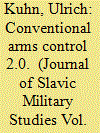

|
|
|
|
|
| Publication |
2013.
|
| Summary/Abstract |
For more than a decade Europe's once unique arms control acquis is in decline. This pertains foremost to conventional arms control. An assessment of current political North Atlantic Treaty Organization (NATO)-Russia problems and military insecurities on the continent shows that a modern approach to conventional arms control could positively contribute to security and stability. In times of financial austerity, a new framework has to focus on mutual military reassurances, transparency, conflict prevention, and the links to nuclear arms control. To achieve such a goal, U.S. leadership, as well as Europeanization of the Reset policy, is needed.
|
|
|
|
|
|
|
|
|
|
|
|
|
|
|
|
| 9 |
ID:
181646


|
|
|
|
|
| Summary/Abstract |
Turkey imposed open-ended blanket curfews beginning in 2015, resulting in gross human rights violations. This article analyzes strategies employed by domestic activists to address violations. It explains what worked, what did not, and why. It argues that longstanding barriers to mass mobilization, including some that predate de-Europeanization, shaped activists’ mobilization strategies. Because of an unfavorable domestic environment, activists used a boomerang strategy, disseminating information to international allies who applied pressure to Turkish officials. This strategy effectively mobilized transnational human rights networks, resulting in a continuous and concerted effort by international actors to persuade Turkish officials to protect human rights while countering terrorism. Nevertheless, the boomerang strategy and a legal strategy to file applications with the European Court of Human Rights ultimately failed to generate a shift in policy. The article concludes with a discussion about the factors that contributed to this outcome.
|
|
|
|
|
|
|
|
|
|
|
|
|
|
|
|
| 10 |
ID:
092877
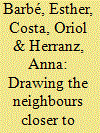

|
|
|
|
|
| Publication |
2009.
|
| Summary/Abstract |
The European Neighbourhood Policy (ENP) launched in 2004 was purposefully conceived as a strategy to encourage neighbours' approximation with the European Union (EU). This aim by the EU to extend its own system of rules beyond member states has become the focal point of the literature on the EU's relations with neighbours. In this article, however, we aim to broaden the scope of the analysis of the EU's role as it pursues policy convergence in the ENP area. More specifically, we argue that the convergence processes can be established on a basis other than EU's norms, namely, international and bilaterally developed norms. Building on this three-fold distinction, we propose a model explaining how and when policy convergence is more likely to happen on the basis of every one of these norms. The model takes into account three variables: the structure of incentives between the EU and its neighbours, mutual perceptions of legitimacy and intra-EU coherence. Based on a number of empirical examples, we illustrate that EU-based convergence is less predominant in EU's relations with its neighbours than it is usually portrayed in the literature.
|
|
|
|
|
|
|
|
|
|
|
|
|
|
|
|
| 11 |
ID:
132529
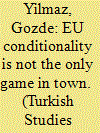

|
|
|
|
|
| Publication |
2014.
|
| Summary/Abstract |
Despite the weakened push by the European Union (EU) conditionality across time, Turkey's Europeanization process continues in a number of areas selectively. Focusing on such a puzzling trend, this article critically examines the role of EU conditionality on Turkey's Europeanization and unpacks domestic drivers of change. The article explores the impact of grassroots actors ?Turkish civil society organizations, business interest groups, media and political parties? on domestic change in the last decade and argues that continuing reforms in many areas in an era of limited EU-push are influenced by domestic actors.
|
|
|
|
|
|
|
|
|
|
|
|
|
|
|
|
| 12 |
ID:
107806
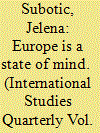

|
|
|
|
|
| Publication |
2011.
|
| Summary/Abstract |
Why does Europeanization-the process of adopting European rules-advance in some countries, while it stalls in others? What explains different European trajectories of otherwise similar candidate states? This article explains foreign policy choices of EU candidate states with an identity-based theoretical framework. In states where European identity is a widely shared social value, the inevitable short-term costs of Europeanization-economic, social, and political-will still be worth the price of admission because becoming "European" trumps other domestic political concerns. In contrast, in countries where the European idea is not broadly shared, pro-European groups will find it hard to forge crosscutting coalitions needed to successfully promote Europeanization with all its associated costs. To illustrate these theoretical insights, I compare Europeanization in Croatia and Serbia, the two Balkan states with similar regional status, shared legacies of communism, and ethnic war, yet quite different European trajectories. I argue that the process of identity convergence explains Croatia's rapid compliance with controversial EU requirements, while in neighboring Serbia, identity divergence has derailed Serbia's EU candidacy.
|
|
|
|
|
|
|
|
|
|
|
|
|
|
|
|
| 13 |
ID:
116409
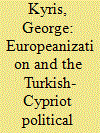

|
|
|
|
|
| Publication |
2012.
|
| Summary/Abstract |
The paper seeks to investigate the European Union (EU) impact on the Turkish-Cypriot (TC) political parties via (a) the TC prospects for EU integration as part of a united Cyprus and (b) the recently commenced Brussels-northern Nicosia interaction. In doing so, the paper engages with the discussion on "Europeanization" and argues that the EU integration has affected TC party competition and its outcome. This process of "Europeanization" is importantly mediated by three specificities of the TC community as a case of contested state: (a) the centrality of the Cyprus problem in the public debate, (b) the limited diplomatic recognition of the self-proclaimed TC administration and (c) the TC international isolation.
|
|
|
|
|
|
|
|
|
|
|
|
|
|
|
|
| 14 |
ID:
172511


|
|
|
|
|
| Summary/Abstract |
Despite the EU accession of the Republic of Cyprus in 2004, the “Green Line” dividing Cyprus that was added as a border in 1974 remains an external EU-border between the Republic of Cyprus (RoC) and the Turkish Republic of Northern Cyprus (TRNC), a self-proclaimed state internationally recognized exclusively by Turkey. Pro- and con European attitudes on Cyprus are therefore not recent phenomena, but date back to the start of EU accession negotiations in 1998 and the Annan-Plan for reunification in 2004. These aspects, however, refer to the Turkish-Greek antagonism on the island and the ongoing national tensions that have resulted in violent conflicts since independence in 1960, the establishment of a demilitarized UN Buffer Zone in 1964 and the division of the island in 1974, also cutting through the island’s capital Nikosia/Lefkoşa. Drawing on fieldwork from 2004/2005 and 2014/2015 regarding the border’s shifting meanings and pointing to the border as a place where pro- and con-EU-articulations converge, emphasis is placed on the borderscape in Nikosia/Lefkoşa that impedes and increases the movement of people and goods. After all, the border is a dividing line that both shapes and exhibits identities. Moreover, it serves as an individual economic resource whilst border-crossings likewise offer benefits. Nevertheless, the border also stands as painful emotional remembrances for people on both sides. The pro- and con-EU attitudes that were dominant when the RoC joined the EU in 2004 have thus been blurred on both sides of the Green Line. The empirical research for this paper has been framed by the question of how this blurring is intertwined with the division of Cyprus and how people are affected by the Green Line as a socio-material and symbolic artefact on the micro-scale of personal feelings, identities and practices.
|
|
|
|
|
|
|
|
|
|
|
|
|
|
|
|
| 15 |
ID:
151667
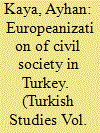

|
|
|
|
|
| Summary/Abstract |
As a clear depiction of unconventional forms of civic and political participation, the Occupygezi movement has revealed that a more comprehensive approach is needed to understand the deep socio-political drives underpinning the Turkish bid for EU membership. Focusing on three different framings, namely Euro-enthusiastic, Euro-sceptic and critical Europeanist frames, developed by civil society organizations in Turkey since the 1999 Helsinki Summit, this article will analyze the transformative effect of the Occupygezi movement on various civil society groups which had previously been Euro-sceptic. Subsequently, the article will claim that the critical Europeanist frame has recently become stronger. Methodologically, the article will be based on a literature survey on the civil society actors, as well as discourse analysis of some particular associations, trade unions and the media organizations in relation to their changing perception of the EU before and after the Occupygezi movement.
|
|
|
|
|
|
|
|
|
|
|
|
|
|
|
|
| 16 |
ID:
168336
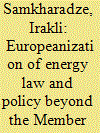

|
|
|
|
|
| Summary/Abstract |
The external dimension of EU energy law is gaining momentum in legal scholarship. The European Union has reached a certain degree of influence in exporting its internal energy rules and values beyond the Member States. Nevertheless, the theory of legal harmonisation between the EU and ‘third countries’ remains underdeveloped. This paper aims to address this deficit by analysing the effects of legal harmonisation in energy outside the current domain of the EU. The paper draws on the example of Georgia, as a Contracting Party to the Energy Community Treaty, and assesses the potential impact of EU energy legislation on Georgia's municipal law triggered by the Community membership. It further uncovers a number of uncertainties that are likely to arise before Georgia in the course of implementing the energy acquis and advocates for the process to be guided through a set of common energy law principles. These aspects are discussed to explain the nature of expanding EU energy law and policy in ‘third countries’ and to contribute to the ongoing debate about energy law, as an emerging academic discipline.
|
|
|
|
|
|
|
|
|
|
|
|
|
|
|
|
| 17 |
ID:
118006
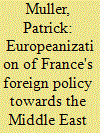

|
|
|
|
|
| Publication |
2013.
|
| Summary/Abstract |
France's prominent role in Europe's policy towards the Arab-Israeli conflict represents an interesting case study for the evolving research on Europeanization. While France's involvement in the CFSP is frequently described as a case of national projection through the EU, this view needs qualification. Proposing a novel conceptual categorization of different member state approaches to European foreign policy cooperation, this article shows that France's involvement in Europe's Middle East policy has gone through different phases. Guided by de Gaulle's politique arabe, France assumed a 'leadership' role in Europe's common foreign policy, leaving a strong mark on its collective diplomacy. Since the 1990s, however, a number of complementary changes have weakened France's capacity for leadership, challenging well-established French foreign policy positions. France's response to the mounting constraints of EU-level cooperation has oscillated between 're-nationalization' and efforts to 'facilitate' a common European approach, displaying a considerable degree of pragmatism and tactical adaptation.
|
|
|
|
|
|
|
|
|
|
|
|
|
|
|
|
| 18 |
ID:
097538
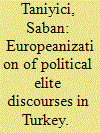

|
|
|
| 19 |
ID:
123430
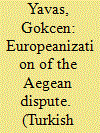

|
|
|
|
|
| Publication |
2013.
|
| Summary/Abstract |
This paper examines how the Aegean dispute which has been one of the contentious issues between Turkey and Greece for more than three decades has been Europeanized on the Turkish side. This Europeanization process started, in particular, with Turkey's candidacy to the European Union granted at the Helsinki Summit of 1999. In this article, the extent of the Europeanization of the Aegean dispute is measured by making references to the security and foreign policy discourses in Turkey. The change in the Turkish elite's discourses, or more concretely, the shift from the confrontational to cooperative discourses, is identified in the speeches delivered by the political leaders from the Turkish side.
|
|
|
|
|
|
|
|
|
|
|
|
|
|
|
|
| 20 |
ID:
137609
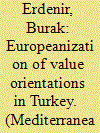

|
|
|
|
|
| Summary/Abstract |
This essay analyzes the change in value orientations of Turkish society in recent decades with reference to the Europeanization process the country has been going through, particularly that embodied in the European Union accession process. As the Europeanization of Turkish political culture is closely related to the consolidation of democracy, the change in value orientations sustaining democracy would be an indicator showing the extent of societal Europeanization in Turkey. Based on the World Values Survey, changes in secular-rational and self-expression value orientations of Turkish society are examined vis-à-vis those dominant in European societies. Levels of religiosity, interpersonal trust, and social tolerance are selected for cross-cultural comparison. The essay elaborates on the reasons Turkish society has been diverging from European societies on value orientations at a time when the country has been experiencing a vast socioeconomic change, with millions of people moving into the middle class.
|
|
|
|
|
|
|
|
|
|
|
|
|
|
|
|
|
|
|
|
|